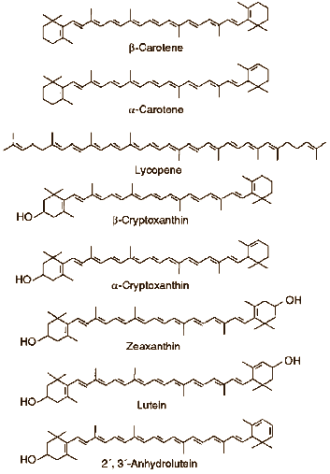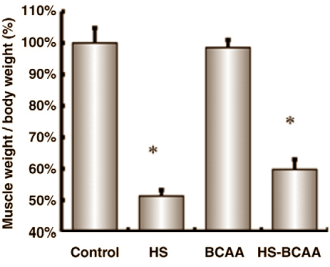|
Definition: "An ergogenic aid is any substance or phenomenon that enhances performance "
|
|
||||||||
07.02.2018 |
|
|
Carotenoids versus muscle atrophy?
A high intake of carotenoids as beta-carotene may protect against muscle breakdown, according to a Japanese animal study that was published in the British Journal of Nutrition in 2013. The researchers, affiliates with Osaka Prefecture University, gave their mice an unhealthy high-dose beta-carotene, which can turn out to be dangerous in humans. But fortunately there are more carotenoids which may have the same anti-catabolic effect, but not have any health risks...
Study
The researchers gave some of the mice a substantial amount of beta-carotene daily through the oral route [B-Carotene]. Other mice received a placebo [Vehicle].
Results
In the muscle tissue of soleus, the amount of ubiquitin conjugates increased after cutting through the nerve. Ubiquitin conjugates are protein fragments to which the cell has glued ubiquitin molecules. This way the cell labels protein as 'ripe for scrapping'.
However, in the denevervated muscles of the mice that had received beta-carotene, the researchers found less ubiquitin conjugate than in the muscles of the mice in the other group.

The actual demolition of muscle cell proteins is done by enzymes such as Atrogin-1 and MuRF-1. These are the molecular equivalents of the shredder and the demolition ball. In the soleus the production of these proteins increased after the denervation, but supplementation with beta-carotene inhibited this process.
How exactly beta-carotene inhibits muscle breakdown the Japanese don't know. They present in vitro data that suggest the possibility that beta-carotene neutralises free radicals that play a role in the first phase of muscle breakdown, and inhibits FOXO3a, a molecular master switch that plays a key role in muscle decay.
Conclusion
Wild speculation
Fortunately, there are all sorts of other substances in food that are chemically similar to beta-carotene, but can not or hardly convert into vitamin A. Alpha-carotene, for example, or beta-cryptoxanthine, or lycopene, or astaxanthin, or lutein. It could just be that those substances protect against muscle breakdown as well...
Source: More: Archives:
|
|
||||||||||||||||






